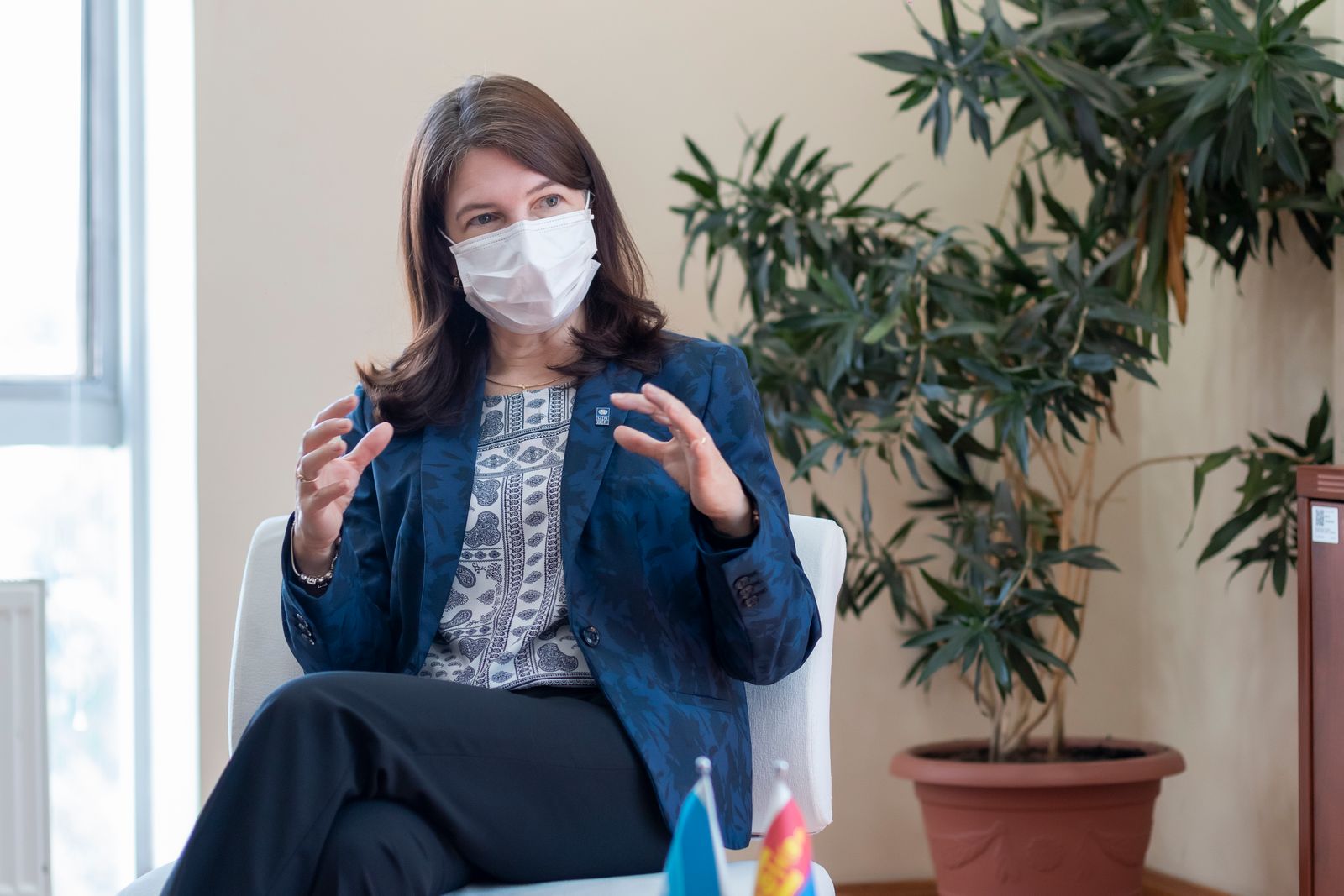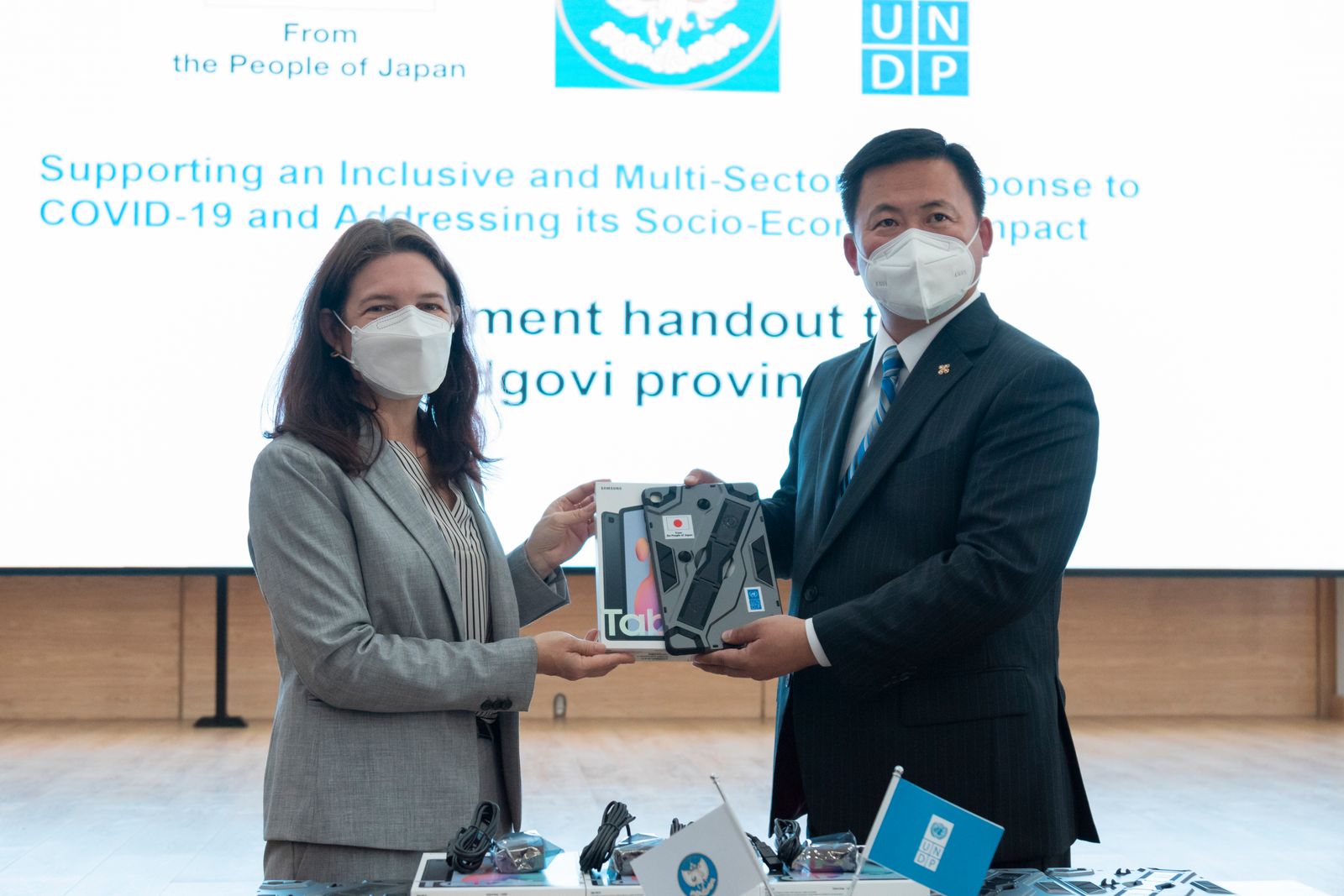We spoke with the UNDP Resident Representative Elaine Conkievich about the goals and results of the projects and programs being implemented by UNDP to support the reduction of the negative impact of COVID-19 on Mongolia's society and economy during this difficult time of the pandemic.
- Could you tell us about the United Nations Development Programme, please? What are the results you aim to achieve?
- The United Nations Development Programme (UNDP) is a leading United Nations body working to end poverty, inequality, and climate change injustice, and operates in more than 170 countries around the world. We are working to achieve the Sustainable Development Goals in Mongolia by reducing poverty, strengthening good economic and social governance, and supporting climate change mitigation and environmental improvement.
- What economic and social results do Mongolia need to achieve the above goals?
- We are studying and doing research on the current situation in Mongolia. Our main focus is on the target groups who are the most vulnerable in terms of benefitting from the development. One of the key principles to achieve the Sustainable Development Goals is to “leave no one behind” . These groups include people with disabilities, herders, people who live in the remote areas, children and youth, and in some cases women who face economic and political inequalities. So much of our work is focused on lifting these people out of poverty, giving them more opportunities, and empowering them. We also focus on the environment, climate change, deforestation, and desertification. They all play an important role in shaping social development.
- What projects is the UNDP implementing against the negative social and economic impacts of the current pandemic?
- In early 2020, UNDP, conducted a rapid integrated impact assessment of the social and economic impact of COVID -19 prevention measures in Mongolia. In late 2020, in partnership with the Asian Development Bank (ADB) and the National Committee on Gender Equality (NCGE), we conducted a further study on the social and economic impact of the COVID 19 pandemic in Mongolia, particularly on girls and women. As a result, we have developed response programs and projects. In particular, with the assistance of the Government of Japan, we have developed and implemented a project “Supporting an Inclusive and Multi-Sectoral Response to COVID-19 and Addressing its Socio-Economic Impact in Mongolia" aimed at empowering social workers, by digitalizing their daily work to make social welfare and protection services more accessible to citizens. The project included several sub-projects and campaigns, including the development of a digital system and provision of tablets and fingerprint scanners to social workers throughout Mongolia. The work of local khoroo or soum social workers have been very demanding, with too much paperwork, and it has been difficult to update the records of people in need of assistance and support them in a more efficient and effective way. With the help of the system and the portable devices, social workers can update citizens' records and information on the spot and quickly add status assessments to the database, which not only provides faster services to citizens but also allows the government to make the necessary decisions based on more realistic and updated data.
In addition, under the project, in cooperation with the Ministry of Labor and Social Protection, a Virtual Assistance Platform or a multi-channel call center has been revamped and put into operation. It is the first center in Mongolia to receive video calls where designated sign language interpreters can assist hearing-impaired or speech-impaired people. There are also other activities carried out under the project, such as a challenge for innovative micro-projects among social workers and creating human rights and ethics impact content for frontline workers and so on.
Other projects and programs are running as well; for instance, efforts are being made to increase herders' sources of income by expanding the range of milk and dairy products availability and introducing the products to the market. Through the Mongolian Sustainable Cashmere Platform, we aim to unify stakeholders' understanding of the origin and sustainability of their cashmere products. As a result, the value of Mongolian cashmere will increase in the export sector. These are targeted programs that will help the Mongolian economy overcome the pandemic.
Green tourism is another target sector. Everything related to tourism is closed currently. UNDP is suggesting to utilize the moment to make progress in planning to turn the Mongolian tourism industry more sustainable and green in the future. In Mongolia, which has a beautiful natural environment, this sector is another source of income to support the economy.
In addition, we have had advocacy work with the Deputy Prime Minister's Office and the Cabinet Secretariat on the long-term vision for Mongolia's recovery from the pandemic.
- They are all very important issues. However, I would like to ask more about the call center. In our country, every ministry, agency, and organization has a telephone line. So, what are the features of the new call center established with your support?
- The call center, located at the Ministry of Labor and Social Protection, has unified all the ministry-level service-related calls and requests. This means reducing calls to multiple locations and related issues related to labor and social protection. The center, which also provides counseling and assistance to the target population in all areas of labor and social protection, is accessible to anyone from anywhere in Mongolia, as well as through online channels, even from abroad.
- How well do you see the Government of Mongolia managing the situation caused by the pandemic?
- The Government of Mongolia has responded to the pandemic with great effort. While most countries in the world are on the brink of a virus outbreak, last year, Mongolia has been free of domestic transmission for many months as a result of a variety of regulations and restrictions. But, of course, these measures have impacted people's lives. Vaccination is more intensive in Mongolia than in other parts of the world. That's a good thing. Mongolia is working on finding a balance between needed prevention measures and lessening the impact on the population. Businesses are closing and household livelihoods are changing. It is challenging for any country to find the perfect solution.
- How satisfied are you with the results of your projects, programs, and work during your tenure as a Resident Representative?
- Everything our team has done is for the good of Mongolia. Not only the Government of Mongolia but also organizations at all levels are very good partners in cooperation. Good cooperation leads to good results. There are also many organizations that support our work. The European Union is funding a project to support employment reform through budget planning in line with the UN Sustainable Development Goals. Canada is sponsoring a project to build a citizen-centered civil service. Switzerland is helping to support local governance. South Korean KOICA is supporting a new project aimed at promoting women's participation in decision-making in the political sphere. We are very pleased with the results of these joint efforts. I have been working in Mongolia for a year and a half. With the joint efforts of Mongolian citizens and our partner organizations who understand and support our work, we will continue to strive for greater results in these difficult times of this pandemic.
- Thank you very much.

 Locations
Locations





